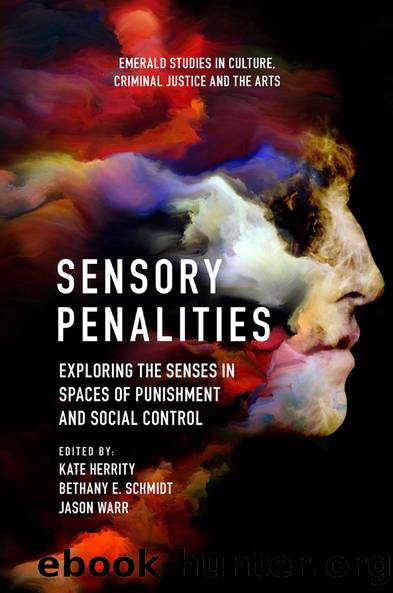Sensory Penalities by Kate Herrity Bethany E. Schmidt Jason Warr

Author:Kate Herrity, Bethany E. Schmidt, Jason Warr [Kate Herrity, Bethany E. Schmidt, Jason Warr]
Language: eng
Format: epub
Tags: Nonfiction, Social & Cultural Studies, Social Science, Crimes & Criminals, Penology, Criminology
ISBN: 9781839097287
Publisher: Emerald Publishing Limited
Published: 2021-02-08T05:00:00+00:00
Exploring the Sensory Criminal Justice Experience: The Research Study
Of particular concern for the analysis of myself as an embodied researcher is how these sensory experiences come together to form a holistic emotional experience of the place and how this can assist in better appreciating the meanings and lives of people in the setting under study (Longhurst, Ho, & Johnston, 2008). To illustrate my argument, in this chapter I explore how I subjectively experienced doing ethnographic fieldwork in a Probation approved premises (referred to informally as a probation hostel) over 21 months, setting my experiences in the context of previous sensory reflections on ethnographies.
Located in a primarily rural region of England and Wales, the hostel formed a single case study exploring the lived experiences of people convicted of sexual offences from their entrance into the hostel after release from prison, to their subsequent exit into the community. In this fieldwork site, I engaged in participant observation and semi-formalised interviews with mainly adult male residents convicted of a sexual offence and staff. Access included the staff offices, resident living and recreational areas and outdoor spaces.1 In these fieldwork reflections, I consider how I became embedded within the physicality and sensorality of the research site; feeling some of the same impacts of the constraints of the architecture and interpersonal power relations on my sense of being that the residents and staff also revealed. As a result, I had emotional reactions to the sense of place that meant I was able to not only understand my participantsâ accounts or behaviours in the abstract (as an onlooker) but also empathically as one who feels some of the same impacts of place and space as they do. I know that saying I was able to empathically relate (albeit only partially) to the experience of people convicted of a sexual offence is very contentions (writing as a female with no convictions), but this sharing of the experience of place was able to bridge some of those distances between us, allowing for a deeper understanding of life for them, which enabled me to talk about this with them in ways that reflected a shared experience, despite our vastly different social positions, status and envisioned futures. Thus, sensory reflective analysis sensitised me to the emotional realities of hostel life and working that I would otherwise have understood in a much more superficial way. In the following discussions, I consider my experiences as an embedded researcher in terms of the physical building and the social interactions within the hostel under study, bringing out the understanding and appreciations that such a sensory analytical approach afforded me.
Download
This site does not store any files on its server. We only index and link to content provided by other sites. Please contact the content providers to delete copyright contents if any and email us, we'll remove relevant links or contents immediately.
The 1921 Tulsa Race Massacre by Chris M. Messer(344)
Introduction to Criminal Justice - A Balanced Approach by Brian K. Payne Willard M. Oliver Nancy E. Marion(291)
Russia's Sakhalin Penal Colony, 1849â1917 by Andrew A. Gentes(272)
Punishing the Poor The Neoliberal Government of Social Insecurity by Unknown(271)
The History of Newgate Prison by Jowett Caroline;(248)
Serial Killers America and UK - 2 BOOKS IN 1 by Clark Matthew(241)
A History of Police and Masculinities, 1700-2010 by David G. Barrie Susan Broomhall(218)
Restorative Justice in Transitional Settings by Kerry Clamp(196)
Culture, Crime and Punishment by Ronald Kramer(184)
Dangerousness, Risk and the Governance of Serious Sexual and Violent Offenders by Karen Harrison(178)
Organized Crime and Corruption Across Borders by T. Wing Lo Dina Siegel Sharon I Kwok(177)
Routledge Handbook on Immigration and Crime by Holly Ventura Miller Anthony Peguero(176)
The Real CSI by Kate Bendelow(174)
Cops, Cameras, and Crisis by Michael D. White Aili Malm(173)
Policing Gender, Class And Family In Britain, 1800-1945 by Linda Mahood(168)
Women Exiting Prison by Bree Carlton Marie Segrave(163)
A Theory of African American Offending by James D. Unnever Shaun L. Gabbidon(163)
Using Murder by Philip Jenkins(160)
Losing Legitimacy by Gary Lafree(155)
